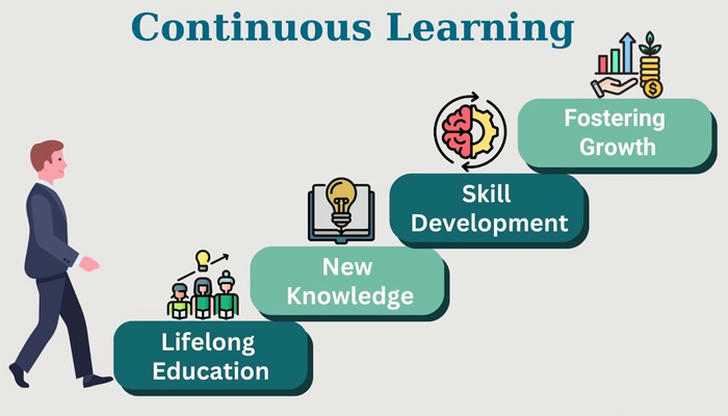The Importance of Continuous Learning: Staying Relevant in Today's Job Market
In today's fast-paced and rapidly evolving job market, staying relevant is essential for career growth. With the rise of new technologies, shifting industries, and changing consumer needs, the demand for new skills and knowledge has never been greater. Continuous learning is no longer just a nice-to-have—it’s a must for anyone looking to remain competitive, develop professionally, and maintain job security. This article explores why continuous learning is crucial and how you can integrate it into your career development strategy.

1. The Rapid Pace of Change in the Job Market
a. Technological Advancements
Technological innovations like automation, artificial intelligence (AI), and machine learning are transforming industries at an unprecedented rate. For example, jobs that once required manual labor are increasingly being automated, while new roles are emerging that require digital skills, data analysis, and coding knowledge.
Take the example of the retail industry: cashier positions are being replaced by self-checkout machines, but roles such as data analysts, digital marketing experts, and e-commerce managers are booming. As technology continues to disrupt industries, the ability to adapt and learn new tools becomes essential.
b. Industry Disruption and Innovation
Many industries are being disrupted by emerging technologies and innovative business models. Companies that fail to stay on top of industry shifts risk becoming obsolete. For instance, the traditional print media industry has been overtaken by digital content and social media platforms. To remain competitive, professionals must constantly adapt by learning about new business models, digital tools, and trends affecting their sector.
By embracing continuous learning, individuals can stay ahead of these disruptions and better position themselves for new career opportunities that arise.
2. The Benefits of Continuous Learning
a. Improved Career Advancement
One of the most obvious benefits of continuous learning is career advancement. As you acquire new skills and knowledge, you become more valuable to your employer or clients, which can lead to promotions, salary increases, and new responsibilities. By staying current with industry trends and acquiring relevant certifications or qualifications, you demonstrate your commitment to professional growth.
For example, someone in a project management role who completes a certification in agile methodologies is likely to be seen as more capable of handling new, dynamic projects, which may open doors to senior roles.
b. Increased Job Security
Continuous learning plays a vital role in job security. As industries evolve, so too do the skills required to succeed. By continually upskilling, you reduce the risk of being replaced by someone with more current expertise. Learning new skills ensures that you remain an asset to your organization, even in the face of automation or other technological changes.
For example, workers in the manufacturing sector who learn to operate robotic machinery may find themselves better positioned in a field that’s increasingly reliant on automation.
c. Boosted Confidence and Competence
Learning new skills and staying up-to-date with industry trends can increase your confidence. When you’re knowledgeable about the latest tools, trends, and techniques in your field, you feel more competent in your role. This boost in self-assurance translates into improved job performance, as you're more likely to take on challenging projects or offer solutions to complex problems.
Furthermore, the more you learn, the more you grow your intellectual versatility, which fosters greater adaptability to new situations and challenges.
3. Ways to Pursue Continuous Learning

a. Online Courses and Certifications
With the proliferation of online education platforms, learning has never been more accessible. Websites like Coursera, Udemy, LinkedIn Learning, and edX offer a vast array of courses across various industries. These platforms provide flexibility, allowing you to learn at your own pace, whether it’s earning a formal certification or simply learning a new tool or technique.
Industry-recognized certifications, like those in digital marketing, project management, or IT systems, can provide a tangible sign of your updated skills, making you more attractive to employers.
b. Attending Industry Events and Networking
Conferences, webinars, and workshops are excellent opportunities for continuous learning. These events expose you to the latest trends, tools, and best practices in your field. Networking with peers and mentors can also provide valuable insights and open doors to new opportunities.
Additionally, attending these events allows you to stay connected with industry leaders and professionals, giving you a broader perspective on where your industry is headed and what skills will be in demand.
c. Reading and Staying Informed
Reading is one of the most accessible ways to keep learning. Subscribing to industry blogs, journals, and newsletters ensures you’re up to date on current trends. Books, whitepapers, and case studies are also valuable resources for deeper knowledge. Keeping informed helps you make better decisions at work and stay ahead of the curve.
Moreover, reading can inspire you to explore new ideas and avenues in your career that you might not have considered before.
4. Overcoming Barriers to Continuous Learning
a. Time Constraints
A common barrier to continuous learning is finding time, especially for busy professionals balancing work and personal life. However, integrating small learning sessions into your daily routine can make a big difference. For instance, dedicating just 30 minutes a day to an online course or reading an industry blog during lunch can help you stay on track with learning goals.
b. Financial Limitations
While some learning opportunities can be expensive, many high-quality resources are available for free or at a low cost. Websites like Coursera, edX, and Khan Academy offer free courses, and many industry conferences offer discounts or scholarships. Moreover, employers often sponsor professional development or reimburse employees for education-related expenses. It’s worth inquiring about these opportunities at your workplace.
c. Lack of Motivation
Staying motivated to learn can be challenging, but setting clear, actionable goals can help. Break larger learning objectives into smaller, achievable steps. For example, instead of committing to learn a completely new software program, focus on mastering one feature or functionality at a time. Creating a learning schedule or enrolling in a learning community can also provide accountability.
5. Developing a Personal Learning Plan

a. Identifying Learning Goals
The first step in continuous learning is identifying the skills you want or need to acquire. Consider where you are in your career and where you want to go. Do you need technical skills to move into a more specialized role, or are you focusing on leadership skills to take on management responsibilities? Identifying these gaps and setting clear goals will guide your learning journey.
b. Creating a Learning Schedule
Time management is key to making continuous learning a habit. Create a schedule that fits into your daily life and aligns with your personal and professional commitments. Make learning a priority by dedicating a specific time each day or week to learning activities.
c. Measuring Progress and Reflecting
Tracking your progress helps maintain motivation and ensures you’re on the right path. Set milestones and reflect on your progress regularly. Assess your learning methods and adjust your goals as needed to stay aligned with your career objectives.
6. The Role of Employers in Fostering Continuous Learning
a. Supporting Employee Development
Employers can play a crucial role in fostering a culture of continuous learning. Offering professional development programs, workshops, and funding for further education can encourage employees to stay updated with the latest skills. When employers invest in their employees’ growth, they also benefit from improved performance and increased job satisfaction.
b. Creating a Learning Culture
A company that prioritizes learning and knowledge-sharing will likely see greater innovation, collaboration, and adaptability. Managers can support their teams by creating opportunities for informal learning, such as lunch-and-learns, mentoring programs, or knowledge-sharing sessions.
7. Conclusion
In today’s competitive job market, continuous learning is a powerful tool for ensuring career longevity and success. By embracing lifelong learning, professionals can stay relevant, adapt to industry changes, and unlock new opportunities. Whether through formal education, self-directed learning, or networking, it’s important to prioritize personal development and make learning a regular part of your career. As industries continue to evolve, the more adaptable you are, the better positioned you will be for success in your professional journey.
